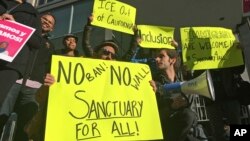The U.S. Justice Department demanded new proof Wednesday from 23 states and cities that they are cooperating with federal immigration authorities to provide information about undocumented immigrants they have jailed for various alleged crimes.
In a new move aimed at eliminating "sanctuary cities" for the immigrants who have illegally entered the country, the country's top law enforcement agency threatened to cut off millions of dollars in federal aid to the states and cities if they fail to produce documents showing how they have instructed their law enforcement, jail and prison officials to interact with federal immigration officials.
"I continue to urge all jurisdictions under review to reconsider policies that place the safety of their communities and their residents at risk," said Attorney General Jeff Sessions, a hard-line anti-immigration advocate.
"Protecting criminal aliens from federal immigration authorities defies common sense and undermines the rule of law," he said. "We have seen too many examples of the threat to public safety represented by jurisdictions that actively thwart the federal government's immigration enforcement. Enough is enough."
The Justice Department demanded proof from three states — Illinois, Oregon and California — that they are cooperating with immigration authorities, along with five major cities — New York, Los Angeles, San Francisco, Chicago and Denver. Eight of the cities cited are in California, the country's most populous state and one of the wealthiest — and also where state and local officials have opposed numerous policies adopted since President Donald Trump took office a year ago.
Instructions targeted
The Justice Department letters to the 23 jurisdictions said if they failed to prove that their policies did not inhibit federal immigration operations, the federal government would seek to subpoena the documents detailing how state and local officials have been instructed to deal with the undocumented immigrants they are holding in custody.
Proponents of get-tough, anti-crime policies in the U.S. say that state and local authorities should actively cooperate with U.S. immigration officers, turning over undocumented immigrants so they can be prosecuted and then deported.
Defenders of the sanctuary cities say they improve public safety, encouraging trust between immigrant communities and local law enforcement authorities in reporting crime, while preserving scarce police funds for combating more serious criminal offenses.
The political debate over U.S. immigration policies was at the center of the three-day partial government shutdown that ended Monday.
The White House and lawmakers have so far been unable to agree on how to protect against deportation for about 800,000 young immigrants who years ago were brought illegally to the U.S. by their parents.
In exchange for protecting the immigrants from being returned to their native countries, Trump wants funding for his most prominent campaign promise — construction of a wall along the 3,200-kilometer (1,990-mile) southern U.S. border with Mexico to thwart further illegal immigration — and stiffer restrictions on other immigration policies.
Trump last year rescinded the deportation protection program for the young immigrants, but gave Congress until March 5 to weigh in on the issue.
The White House said that next Monday it would lay out specifics of what immigration policy changes it wants Congress to adopt.





